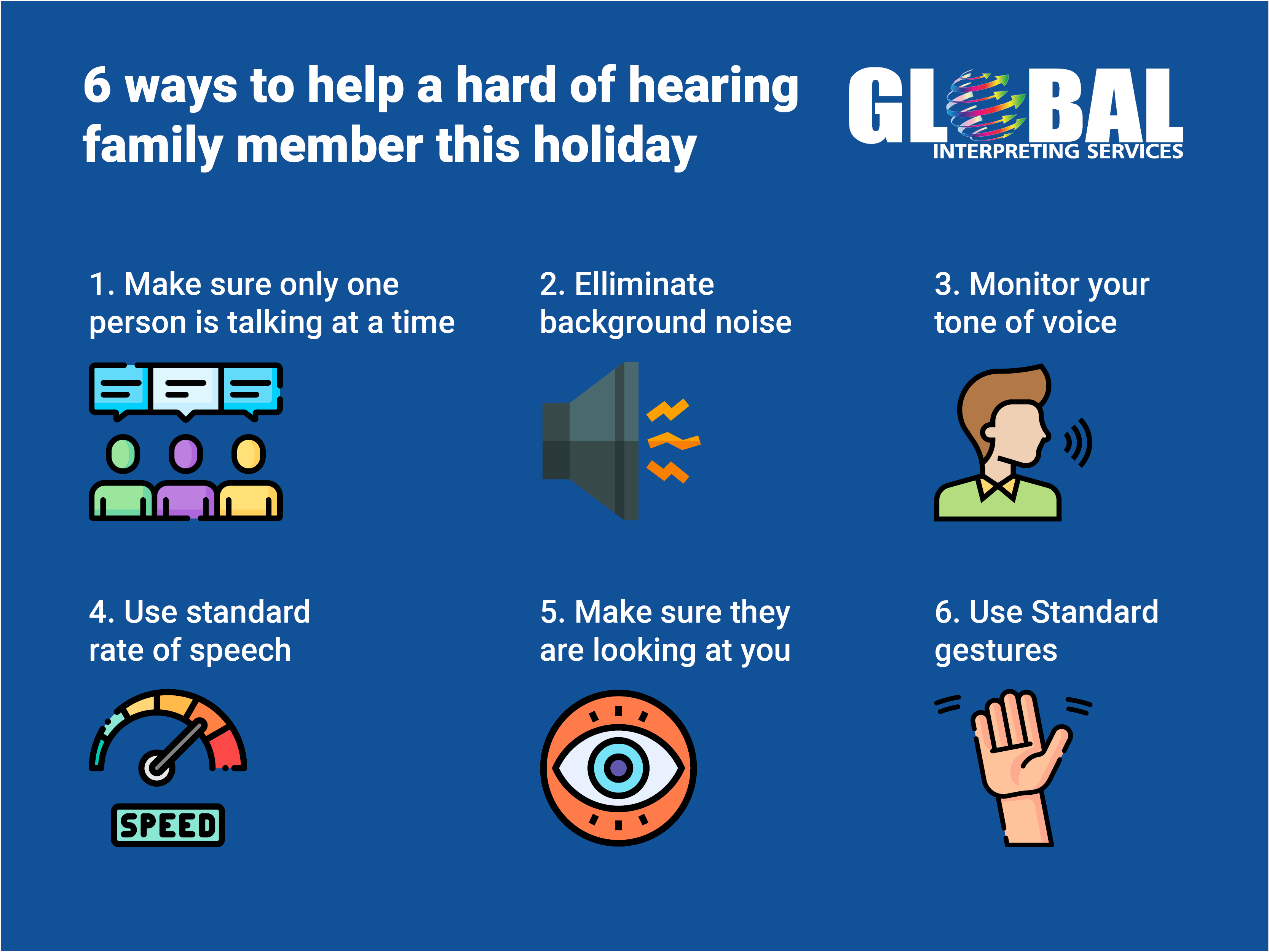I am the daughter of a deaf father who did not use Sign Language, and his father was hard of hearing. Communication issues have been a part of my life since birth. Now, what I do professionally is work through communication issues!
With the holiday season upon us, I’m certain there will be many holiday gatherings, so I’d like to share some practical and helpful tips with you that I have learned to use over the years. These are tips that will help you communicate more smoothly with hard of hearing family and friends. Of course, these tips are helpful year-round, so you may want to save this blog for review once in a while. You can also download and print our free guide, so you have these tips on hand when you need them.

Here are 6 tips for communicating with a hard of hearing person at your next gathering:
1. Make sure only one person is talking at a time
When people gather, they often get anxious and excited, wanting to comment and share their stories. But when there is a lot of noise, it makes it hard to hear the speaker. This makes it difficult for a hard of hearing person to understand, especially if they read lips (They can only lip read one person at a time). Sitting in a circle and practicing “turn-taking” will make your Deaf and hard of hearing family members and friends feel more comfortable and included in the conversation as a whole.
By making a family rule of "turn-taking" during conversation you can greatly improve their ability to follow along. Or you can just ask for the courtesy of not talking over one another, allowing for all family members to participate.
2. Eliminate background noise
Background music can be very lovely… if you don't have hearing issues. But when you struggle to hear, it can create confusion. If you have music or the TV on, keep the volume low.
Also, if you are in a room that echoes it will be hard for the person to understand you. Keep that in mind when trying to hold conversations that they could be a part of.
Following both of these tips will help limit the effort hard of hearing family members will use to keep up with conversation.
3. Adjust the pitch of your voice
Not all pitches are the same. Hearing loss often begins with the loss of higher pitches, meaning higher-pitched voices may be more difficult to understand.
But hard of hearing people are all different. Some hear high tones better, and some hear low tones better (this is the majority).
If your voice is naturally high-pitched, and your family member is struggling to understand you, try lowering the pitch of your voice to help the person understand you. Or vice versa if you have a naturally low voice that they struggle to understand.
4. Modify the speed of your speech
Speaking too fast or too slow can impact peoples' ability to understand you. If you speak too fast, struggles to comprehend can add up. Just keep in mind that speech can become muddled, for those who lip read, if you speak either too quickly or too slowly. (If you speak too slowly, it can still be too hard to lip read).
Talk at an average speech rate, and take a breath between topics or sentences to slow your speech down a bit. This will make lip reading easier because it will help clue the person to a topic change or the end of a sentence.
For example, my father and grandfather could understand my sister easier than me even though I work with Deaf and hard of hearing people professionally. She has a naturally lower voice and an inherently slower rate of speech. It's just how she talks.
5. Make sure they can see you
Whether they read lips or not, for Deaf and hard of hearing people seeing your mouth will help them to understand you. And if they do read lips it is essential for their understanding. Do not cover your face or mouth while talking to them or lay your chin on your hand. If you have a beard or mustache and the hard of hearing person is meeting you for the first time, this may make it difficult for them to understand you. (When you have a beard or mustache, it covers your lips and changes how you move your mouth when you talk).
The dinner table. Centerpieces can be very beautiful but can interfere with faces during meal conversations. We call this "visual noise." If you have centerpieces, be sure to keep them low. Similarly, if you are sitting in front of a bright light or window, they can also distract or make it difficult to see a person's face and body to determine what is being said.
6. Use body gestures
Hard of hearing people use many body cues to help them understand what is being said. Don't just stand directly in front of them and talk like they are watching just your lips. Making sure you use gestures that can be seen will allow them to pick up on cues and better follow the conversation.
Final Thoughts
Communicating efficiently in group settings can be difficult if you have a hearing loss. Patience and understanding are the best tools a person can have on both sides of the conversation. These tips will help conversations at your next gathering go smoother.
If your loved one has not been diagnosed with a hearing problem, but you notice they are a little withdrawn during gatherings, mention getting their hearing tested. They may not be hearing well, and it's easier to sit back and not take part rather than strain to understand or answer incorrectly. If they answer questions incorrectly, that could also be a sign of hearing loss.
Following these tips can help provide your hard of hearing family members with a better experience at gatherings this holiday season.
For more helpful information on communicating with Deaf and hard of hearing individuals, please like and follow us on X, Facebook, Instagram and LinkedIn.



